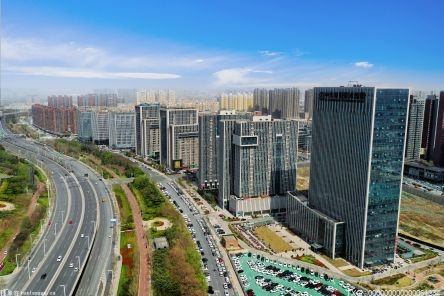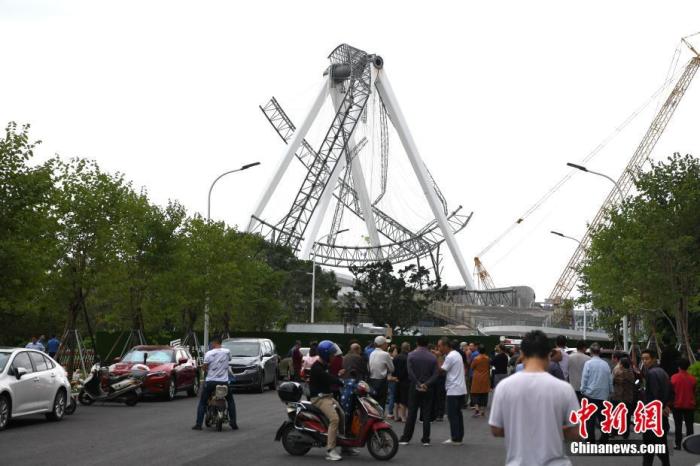当前位置: 首页>关注 >
全球热点!Complex security threats call for modern thinking, measures: experts
2023-06-05 21:34:15 来源:Global Times
As China reiterated its security concepts and initiatives at the 20th Shangri-La Dialogue in Singapore about "unprecedented" security challenges facing the Asia-Pacific, Chinese experts on international relations and national security said on Sunday that China"s national security is now facing more comprehensive and complex threats not only in traditional fields such as geopolitics, but also in those such as finance and high-tech sectors, so the country needs to form modernized thinking and countermeasures to deal with the new situation. The main threat at the moment has been caused by the US-launched new cold war against China despite Washington refusing to admit it, analysts noted.
Chinese President Xi Jinping, at the first meeting of the National Security Commission under the 20th Central Committee of the Communist Party of China (CPC) last week, called for accelerated efforts to modernize the country"s national security system and capacity.
The national security issues China faces today are "considerably more complex and much more difficult to be resolved," the meeting said. It stressed the necessity of being prepared to deal with worst-case and extreme-case scenarios and being ready to withstand "high winds, choppy waters, and even dangerous storms."
 【资料图】
【资料图】
On Sunday, Chinese State Councilor and Defense Minister Li Shangfu delivered a highly anticipated speech at the Shangri-La Dialogue in Singapore. "People cannot but ask these questions: Who is disrupting peace in the region? What are the root causes of the chaos and instability? And what should we stay vigilant about and guard against?" said Li.
These questions must be answered in the interests of the security, stability and future of the Asia-Pacific, Li underscored. Noting that "a certain country" has incited "color revolutions" and proxy wars in different regions, created chaos and turbulence and just walked away leaving a mess behind, Li added that such things should never be allowed to happen in the Asia-Pacific region.
Experts said China"s national security concerns are in line with the shared concerns of the ASEAN and other regional countries hoping for peace and stability.
Extreme-casescenario
Jin Canrong, associate dean of the School of International Studies at the Renmin University of China, told the Global Times on Sunday that "the worst-case scenarios" mentioned in the National Security Commission meeting refers to "challenges such as a massive geopolitical crisis or another global financial crisis," but "the extreme-case scenarios," to be clear, "means the danger of war."
China always maintains high alert over threats to its national security, but if there is anything that can bring "dangerous storms" or the danger of war, that would definitely be the Taiwan question, Jin said. "The US" increasing provocations and the risky acts of Taiwan secessionists could bring an imminent threat that may cause a war in the region," Jin noted.
Li Wei, an expert on national security at the China Institute of Contemporary International Relations, echoed that view, saying that there are challenges stemming from both international and regional issues, terrorism and those brought by unilateralism and trade protectionism. "A mindset of dealing with worst-case and extreme-case scenarios should be applied in addressing affairs related to the South China Sea and the Taiwan question," the expert said.
In 2024, the US will hold its presidential elections, and the island of Taiwan will also hold a regional election, and one possibility for an "extreme-case scenario" is Donald Trump, if reelected as president withdrawing US resources from the Russia-Ukraine conflict and maximizing the manipulation of the Taiwan question to provoke and contain China, and Lai Ching-te, a radical secessionist politician on the island, winning the elections, as these radical and unpredictable forces could recklessly cross the bottom-line and force China to solve the Taiwan question once and for all, said Jin.
China has exercised restraints in responding to the US-launched new cold war, and Washington is the side that is provoking uncertainties and major impacts, so even though China is making full preparations and trying its best to deter and prevent "the worst or extreme-case scenarios," the extent of the danger of a war breaking out in the region in the near future is still unclear, analysts said.
Favorableenvironment
The first meeting of the National Security Commission under the 20th CPC Central Committee last week called for initiative to be taken to "shape a favorable external security environment for China to better safeguard its opening up and push for a deep integration of development and security."
"Believe it or not, after the Biden administration issued its latest National Security Strategy in October 2022, a new cold war against China was launched," Jin said.
The US has clearly identified China as its "only competitor," and Washington is mobilizing different political forces and business groups within the country as well as its allies around the globe to join this new cold war, but the mobilization has not been very successful. More importantly, the US also wants to avoid a hot direct war when launching its comprehensive containment against China, and this is why its senior officials are desperately seeking communication with China but with no sincerity in reducing its hostilities, Jin noted. "All this proves that a new cold war has already been launched by the US."
So the key to avoid worst-case and extreme-case scenarios is to work together with all peace-loving parties, including US business elites and Western countries, to shape a favorable environment that not only benefits China, but also provides certainty and stability for everyone who hungers for peace, development and recovery, experts said.
Recent high-profile China trips made and to be made by executives of top American companies such as Elon Musk of Tesla, Jamie Dimon of JPMorgan, and Jensen Huang of Nvidia have made headlines around the world, as they are seeking to expand their business in the world"s biggest and most vibrant market due to its high certainty and stability.
Executives from a couple of top UK companies, including the executive chairman of Jardine Matheson Holdings Ben Keswick, also met with senior Chinese officials recently, even as some Western officials, including those in the US and some of its allies, are calling for "decoupling" or "de-risking" in their trade ties with China.
Jin said forming friendly ties and mutual trust, providing opportunities and benefits, and building a community with shared future with others are some of the most effective measures being taken to prevent the "the worst-case and extreme-case scenarios."
After unilaterally launching a new cold war against China, the US has failed to mobilize its own big companies and business elites in different industries, and has also failed to mobilize its key allies such as major EU members including France and Germany. This means the new cold war is exerting limited harm to the world economy, and also makes the damage caused by US hegemony and unilateralism more manageable in terms of finance, economy, as well as supply and industrial chains, experts noted.
The National Security Commission meeting also called for dedicated efforts to safeguard political security and improve the security governance of "internet data and artificial intelligence (AI)." It also called for expedited endeavors to establish a risk monitoring and early warning system.
Shen Yi, a professor on cybersecurity and international relations at Fudan University, told the Global Times that China will embrace and make the best use of these cutting-edge technologies, to better unleash productive forces and better serve its governance and national security.
关键词:
为你推荐
-

全球热点!Complex security threats call for modern thinking, measures: experts
-

今日天津老凤祥黄金价格查询(2023年6月5日)_全球快播报
-

盛业(06069)附属拟出售应收账款 预赚370万元
-

2023年5月紧凑型车投诉指数排行:保价仅是营销噱头
-

【对联炼句】(15)省略了介词“于”的动词谓语句
-

肖战撞脸狗狗表情包 一模一样的可怜小表情太萌了!
-

2023年6月5日山东省葡萄糖酸钠价格最新行情预测_环球信息
-

欣旺达:将继续深耕储能领域,提升储能电芯自供率
-

今热点:关于湖南省污染治理和节能减碳专项(污染治理方向)2023年中央预算内投资计划拟支持项目的公示
-

重庆录取通知书什么时候下来一般发一外好久出 报资讯
-

幼儿园最调皮的学生怎么管_幼儿园调皮孩子的管理
-

我找到了阅读GitHub项目源码的最佳姿势,太舒服了! 视讯
-

金源博:原油高开低走,短线测试72.0一线支撑|当前关注
-

亚马逊店铺关联的原因是什么?有哪些?|每日快讯
-

魔枪士狩猎者装备推荐_魔枪士狩猎者技能加点
-

5部门印发《全民健身场地设施提升行动工作方案(2023-2025年)》
-

【世界快播报】网友发布视频《三亚被宰记》,三亚通报调查情况
-

带霜古诗有哪些 9.含“霜”字的诗句有哪些
-

因夸大病情、强迫交易等,朔州生殖医院15人被逮捕
-

全球今日报丨阳光宅男歌词背景 阳光宅男歌词
推荐内容
- 全球热点!Complex security threats call fo
- 今日天津老凤祥黄金价格查询(2023年6月5日)_全
- 盛业(06069)附属拟出售应收账款 预赚370万元
- 2023年5月紧凑型车投诉指数排行:保价仅是营销噱头
- 【对联炼句】(15)省略了介词“于”的动词谓语句
- 肖战撞脸狗狗表情包 一模一样的可怜小表情太萌了!
- 2023年6月5日山东省葡萄糖酸钠价格最新行情预测_
- 欣旺达:将继续深耕储能领域,提升储能电芯自供率
- 今热点:关于湖南省污染治理和节能减碳专项(污染
- 重庆录取通知书什么时候下来一般发一外好久出 报
- 幼儿园最调皮的学生怎么管_幼儿园调皮孩子的管理
- 我找到了阅读GitHub项目源码的最佳姿势,太舒服了
- 金源博:原油高开低走,短线测试72.0一线支撑|当
- 亚马逊店铺关联的原因是什么?有哪些?|每日快讯
- 魔枪士狩猎者装备推荐_魔枪士狩猎者技能加点
- 5部门印发《全民健身场地设施提升行动工作方案(2
- 【世界快播报】网友发布视频《三亚被宰记》,三亚
- 带霜古诗有哪些 9.含“霜”字的诗句有哪些
- 因夸大病情、强迫交易等,朔州生殖医院15人被逮捕
- 全球今日报丨阳光宅男歌词背景 阳光宅男歌词
- 卡针可以用什么代替(卡针)-世界观察
- 资讯:鼠标点击右键没有反应怎么回事(鼠标右击
- 铝木门好还是木门好(铝木门跟实木门有什么优缺点
- 每日播报!专访:美国没有资格充当民主人权教师爷
- 环球热文:8k纸是多大比a4大多少_8k纸是多大
- 今年高考注意防暑!中东部大范围炎热天气下周登场
- 天天观点:银月城传送门训练师-银月城
- 新疆巴州戈壁滩上逾1万峰骆驼换“夏装” 牧民采
- 环球快资讯:6月3日至4日,30台老爷车+100台超跑
- 斯托茨预计加盟雄鹿辅佐新帅格里芬-全球热推荐
- 越来越像安卓了!iOS 17下周发:或开放第三方应
- 小英雄雨来原名雨来没有死_雨来没有死
- 乘势而上促消费 世界新资讯
- 小脚印简笔画图片_可爱小脚印简笔画
- 德媒:萨内未来一年将力争更好表现,拜仁将观察以
- 当前滚动:神舟十五号载人飞船返回舱成功着陆 神
- 全球快资讯:13秒!京多安创造足总杯决赛最快进球
- 反转录与逆转录有区别吗_反转录和逆转录有什么区
- 路由器线怎么插图片_路由器线怎么插-天天速讯
- 五阶魔方棱块还原公式(五阶魔方棱块特殊情况)-
油气
- 1
- 2
- 3
- 4
- 5
- 6
- 7
- 8
- 9
- 10
经济
-

中新网通辽10月18日电 (记者 张林虎)18日,记者从内蒙古自治区通辽市奈曼旗公安局获悉,国家一级保护动物--梅花鹿误入当地村民羊群,
-

中新网杭州10月18日电 (王题题 胡燕婕)云天收夏色,浅秋正渐浓。10月18日,浙江杭州市西湖游船有限公司推出的惠民多站点“西湖环湖游
-

中新网福州10月18日电 (记者 龙敏 王东明)福州市晋安区官方18日晚间通报,18日14时47分,晋安区岳峰镇化工路爱摩轮商业广场项目摩天
-

中新网兰州10月18日电 (闫姣 艾庆龙 吉翔)“红山白土头,黄河向西流。”不少人疑问,天下黄河向东流,为何甘肃永靖县这段黄河却向西
-

中新网北京10月18日电 《清华城市健康设施指数》18日在北京发布。报告成果显示,城市健康设施指数领先城市以中心城市和东部沿海城市

